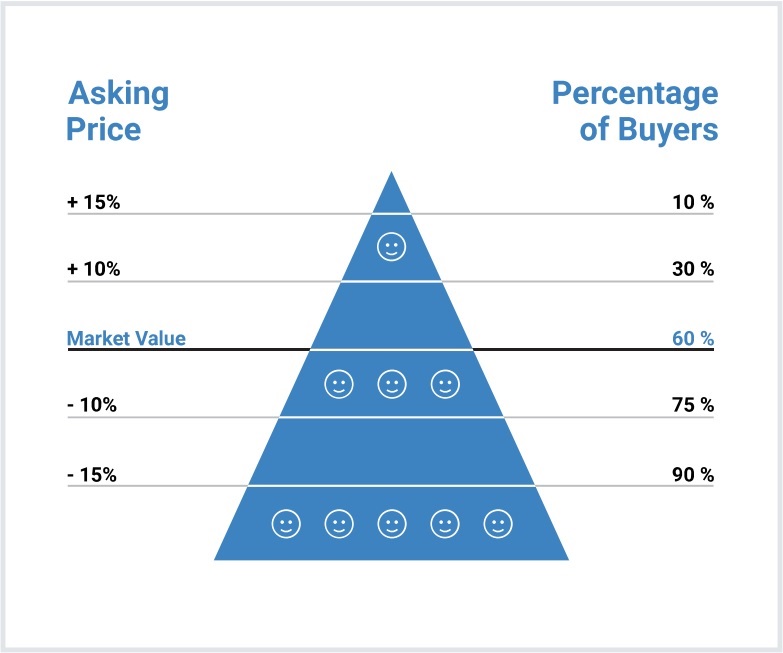
The listing price at which you decide to put your home up for sale has a huge impact on your final sales price. If you price your home wrong it can lead to low demand and a lower sales price.
Buyers are doing everything they can to submit winning offers on homes in todays market, but that does not mean you will get top dollar as a home seller.
In this article, we explain the things you need to do and consider when trying to price your home correctly so that you can maximize your sales price.
Check Out Comparable Properties For Sale
Sold Homes
The number one thing you can do to figure out the value of your home is to look at comparable properties that recently sold. When a property has recently sold, the invisible hand of the market has determined the fair market value for that home.
You can compare properties that are similar to yours to try and determine your homes worth by their recent sale. When doing this be mindful to compare properties that are similar to yours. Try to stay within certain parameters of your home. Keep the square footage within +/- 15% of your home, with the same number of beds and baths.
Use the Price Per Foot calculation below to compare the value of your home versus ones that recently sold.
Active or Under Contract Homes
Active homes or under-contract homes are homes that have not yet sold. When looking at these to compare to your home, be careful. Just because someone decides to list their home at a certain price, does not mean that is it’s correct market value. One could list their house for an extremely far-fetched price, and comparing your home to theirs would not do you any favors if you’re trying to accurately price your home.
We suggest prioritizing recently sold homes and putting less emphasis on homes still active on the market.
Understanding Square Foot Cost Comparison
The size of your home and the lot which it sits on makes a considerable impact on the price of your home. The most common way people assess the value of a property is by looking at its price per foot(PPF). You calculate the price per foot by taking the price of the home divided by the total living square footage of the home.
For example: A home that is for sale for $450,000 and is 2,000 sqft gives us a cost per foot of $450,000 / 2,000 = $220
If your home is comparable to the above example and is 2,200 sqft, we could estimate your value at 2,200 * $220 = $484,400.
Beds and Baths Comparison
You must also consider the number of bedrooms and bathrooms a home has, not just the PPF. A home that has an extra bathroom would provide more value to a buyer, and thus needs to be considered.
Property Size
The size of the land you are selling must also be considered when pricing your property. Is your lot large enough that you could subdivide it and build another home? That offers tremendous value to a buyer who may not need such a big piece of land. Or, is your lot so small there is no back yard and located on a zero lot-line with your neighbors? These can be important to buyers and will impact your homes value.
Location
The location of your home is going to be a very big consideration to buyers. Do you live in a highly desirable city or town? Within that town, do you live in the section of town where most people want to be? Location is not something that can easily be generalized as no two properties on planet earth are the same.
When people are choosing where to live, they are often making decisions based on:
- Quality of Public Education
- Public Transportation
- Distance to Points of Interest
- Crime Rates
- Local Tax Rates
- Lifestyle (boating, golfing, etc)
How does your property stack up with others when considering the above list, or whatever else you think people are looking for in and around your community?
Features, Finishes & Style
The interior of your home makes a huge difference in the price of the home.
Features
What sort of features does your home have that could increase its value? Features that could really increase a home’s value are:
- Pool
- Oversized Deck
- Outdoor Summer Kitchen
- Finished Basement
- Open Floor Plan
- Ceiling Height
Finishes
The interior finishes of a home also make a difference in its value.
- Counter Tops
- Crown Molding
- Baseboard Sizes and Styles
- Column Treatments
- Trim Styles
- Stair Rods
- Flooring Type
The finishes of a home are usually what dress up the home and take it from being an empty box to a lovely home. There can be a very big difference in finishes between homes, and it’s the finishes that usually give people the “wow” factor when entering your home.
Style
Buyers typically want to purchase a home that they can move into without needing to make any updates. Having a contemporary interior style to your home is what most buyers are looking for and will drive up demand for your home.
Be Careful: If you have your own eclectic style and have fashioned your home in a way that suits your tastes but not the majority of people, that will likely reduce your home value. A buyer will likely look past your personal style and consider what it would cost them to convert the home into a more contemporary style.
ZEstimate
ZEstimate is an estimate of the value that Zillow puts on homes. Use caution when considering this number. Zillow uses an algorithm to try and determine home value, but real estate is a very personal thing. Values are difficult to assess by computers and algorithms. Zillow has tried to purchase and flip residential real estate properties, which turned out to be a massive failure on their end. They learned the hard way that estimating value cannot be reliably done by an algorithm.
Consider the Season
The time of the year may impact your sales price depending on where you live. In South Florida, the real estate market is hot in the winter months when many snowbirds travel down south and decide they want a vacation home here. In the northeast, the cold temperatures demotivate people to look at new housing in the winter months.
Your house may fluctuate in value based on when you are selling it, simply because the demand is greater in certain times of the year.
Final Thoughts on Pricing Your Home
It’s better to underprice your home than to overprice it. An overpriced home will deter people from ever coming to see it, while an underpriced home will motivate more people to see the home and fall in love. An underpriced home will be bid up by the market as buyers know the real value of the home, while an over-priced home will typically sell for less than its potential.
Lastly, we always recommend hiring a professional realtor. If you want to get top dollar for your home, stats don’t lie. Properties sold by owners who are not licensed real estate agents profit less than ones who hire qualified professionals. If you are adamant on selling your home without a real estate agent, here is how to get top dollar.
